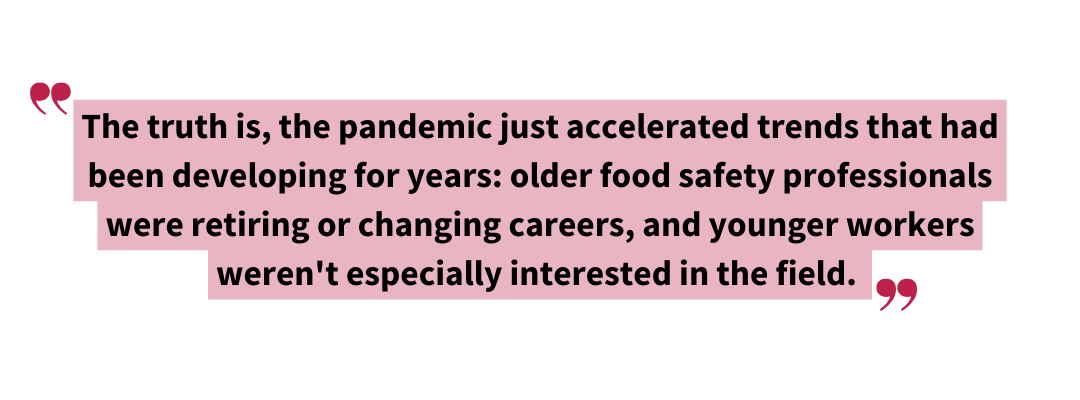Where Are All the Food Safety Specialists?
The most pressing worry for many executives and managers working in food safety isn't compliance with FSMA provisions. It's not auditing vendors for FSVP compliance. It's not stricter FDA Food Defense inspections that started in September. It's probably not even the increase in recalls we've seen over the last few years.
All of those are important challenges, and getting them right is critical for food producers who care about quality and safety or want to avoid a costly food recall. But they're also normal food safety challenges: the things you expect to deal with in the everyday work of protecting public safety.
The real crisis keeping managers up at night is that there are not enough trained food service professionals to handle even standard workloads, let alone take up the growing list of emerging food safety challenges on the horizon. And with output forecasted to rise significantly, these staffing shortages will worsen.

Food safety managers need to understand the root causes of these shortages and address them before they turn a nightmare into a public health crisis. One key area of focus is food safety specialist attrition. Getting experienced, qualified personnel to not leave the field is the first step to stopping the bleeding and beginning to recover from this historical labor shortage.
The Food Safety Labor Crisis by the Numbers
Nobody working in food safety would disagree that there's a crisis brewing in staffing and labor availability. But it's difficult to get a handle on the scope of the problem without seeing the stats:
- According to Bristol Associates, Inc. via Food Industry Executive, 73% of F&B manufacturers report facing recruitment challenges.
- In 2023, Food Safety Magazine reported that the biggest post-pandemic challenge food producers faced was hiring and retaining qualified talent, with "staffing" being the largest challenge for 48% of companies that hadn't yet recovered.
- Food Engineering Magazine reported that the two biggest trends for manufacturers in 2022 were automation (27%) and staffing challenges (20%). The latter was up from 14% just a year earlier, coupled with 16% stating a decline in worker availability was a big concern.
- The GFSI has shown significant concern over the lack of talent in the profession, citing the increasing age of food safety auditors and the high number of auditors leaving the career post-pandemic.
- In 2021, the FDA inspected fewer than half of the facilities they did in 2011, leading to some of the biggest food safety problems in the news over the last few years, including the baby formula shortage that affected so many. One of the key reasons cited was a lack of available auditors.
None of these stats should be surprising to industry veterans. The truth is, the pandemic just accelerated trends that had been developing for years: older food safety professionals were retiring or changing careers, and younger workers weren't especially interested in the field. Something needs to change.
Understanding Food Safety Attrition
Exploring every problem with food safety as a career is well beyond the scope of a single article, so we'll focus on the low-hanging fruit: attrition. Attrition has been a major post-pandemic problem across most industries, with many older workers choosing to retire early or exit their demanding careers for easier jobs as they wait to reach retirement age.
This is especially true in food safety due to a number of factors specific to this career:
- High Travel Requirements: It's common to be on the road for half a month or put hundreds of miles on your car every week.
- Low Appreciation: Many companies still treat food safety as a cost center rather than an essential function.
- High Requirements With Limited Rewards: The industry demands tremendous specialization, constant learning, incredible attention to detail, and significant education. While these efforts are critical to ensuring food safety, the recognition and rewards often don’t fully reflect the expertise and dedication required to excel.

Solving the Attrition Problem in Food Safety
What can companies do to stem this tide of attrition? The obvious answer is to increase pay scales, but that's not really a satisfactory long-term solution for companies or workers. Especially as younger workers (who prioritize development, company culture, and work/life balance over pay) come into the field and quickly burn out.
Instead, companies should prioritize structural issues that improve culture and work quality. Some suggestions include:
- Increased Automation and Remote Monitoring: One of the most common complaints about food safety work is how much travel is involved. Especially for experienced workers who've been at it for decades, spending half of their time away from family can get old.
Companies can dramatically improve retention by including more automation and remote monitoring in their food quality programs. While nothing beats having an auditor walk the line, many potential problems can just as easily be caught with sensors as they can with airline tickets. Even small cuts in travel requirements can be a big deal. - Create Clear Career Levels: For professionals who dedicate 20 or 30 years to mastering a niche specialization, the journey should lead to more opportunities, not limitations. These individuals invest immense time and effort, becoming world-class experts, and they deserve a career trajectory that recognizes their specialization and opens doors for continued growth. Companies should create new career levels that inspire food safety employees — especially high performers who thrive on challenges and continual development
- Make Food Safety a Priority: Despite knowing how costly a recall can be or how turning food safety into a competitive advantage can supercharge growth, many food safety experts still feel like their role is an afterthought or checkbox.
Organizations must prioritize food safety as a critical component to protecting their bottom line. This includes demonstrating greater appreciation for food safety teams, providing them with a meaningful role in shaping strategic decisions, and fostering accountability by addressing issues at their source rather than placing undue blame on those delivering the message.
More pay would also likely be appreciated — it almost always is — but the reality is that solving attrition problems is about addressing workplace culture rather than adjusting the total compensation matrix.
Meanwhile, companies still having difficulties filling critical food safety positions can look at outsourcing roles while determining the right approach to overcome this challenge.
If you need help replacing a skilled food safety professional, contact AIB International to learn about our Assign an Expert program. This service provides temporary placements to ensure business continuity during transitions. In just seven days, we can have a food safety expert at your facilities in any role you need. After all, food safety is too vital to be hindered by a shortage of qualified applicants and high turnover rates.


